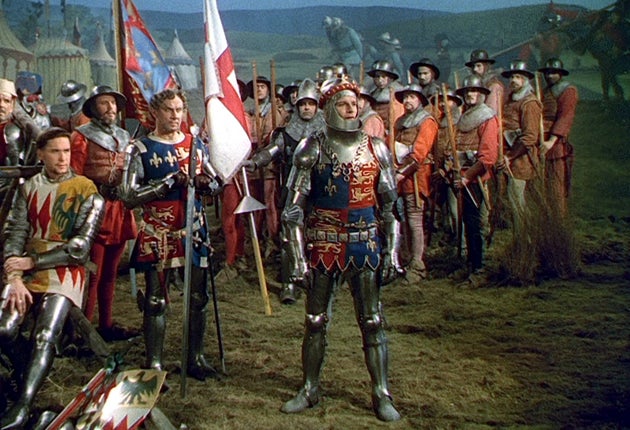1415: Henry V's Year of Glory, By Ian Mortimer<br/>Conquest, By Juliet Barker
The trouble with Harry

The 15th century is emerging from the shadows into a crucial hinge period between medieval and modern Britain.
Chivalric idealism recedes as war becomes a matter of artillery barrages rather than heroic endeavour, parliamentary muscles flex as usurper succeeds usurper, and wealth from wool and manufactures becomes a more indispensable adjunct of political power than waging war.
Ian Mortimer's and Juliet Barker's new histories constitute a stimulating and complementary introduction to the first half of the century. Both are remarkable books: Mortimer's in its highly original approach to the presentation of a single year and his scorching criticism of Henry V, Barker's in its long-neglected story of how the English came to occupy rather more land in France than the French king himself did – and how after 30 years they lost every foot of it within 12 months.
Mortimer writes biographical history with formidable energy and panache, but hackles will rise at his headline-grabbing approach to Henry V, whom he wants to dash from his pedestal. His method is an enthralling experiment in time-travel: this book takes the year of Agincourt a day at a time, building an in-depth picture of how those who lived through it experienced events. At times it reads like a novel, at times it offers subtly nuanced back story, at times it descends into somewhat dubious psychological guesswork.
There are three main themes: what Henry did both to prepare for war and prevent domestic threats, what the warring factions in France were plotting, and how matters stood at the Council of Constance, which Sigismund, King of the Germans, convened to settle the papal schism, confound heresy and persuade his fellow monarchs to stop fighting and unite against pagans.
The first illuminates Henry's character, which Mortimer sees as more cold steel than golden boy: needlessly cruel and misogynistic. The second reveals the challenges that faced him in France – unreliable allies, unfamiliar terrain, disease and impossible logistics. The third emerges as essential: mapping Henry's concerned involvement in Constance helps us to appreciate that such issues as the papal schism and Lollard heresies were both threats to immortal souls and political dynamite in terms of European unity against heathen threat. As to the battle itself, the myth of the enormous French army at Agincourt is exploded, but Henry's controversial massacre of his prisoners is defended as pardonable panic.
This is the most illuminating exploration of the reality of 15th-century life that I have ever read. But just because Mortimer succeeds so well, his conclusions as to Henry's "flawed" character jar. Sure, he was more Parsifal than Lancelot, but given universal religiosity, was he really a bigot?
Compared to the contemporary punishments for errant females that Barker offers (piercing holes in tongues, burying alive), threatening to break women's left arms if they were found close to his troops is almost merciful – certainly better than breaking right arms. And it seems unfair to label him joyless and misogynist because of the lack of evidence of jollies in a year during which no commander-in-chief in his senses would be holding tournaments for fun or dallying with wantons.
Moreover, by stopping at Christmas 1415, Mortimer cheats. His declaration that Henry achieved what he did by luck, not good management, is not supported by Conquest, a blow-by-blow, siege-by-siege account of the king's whirlwind campaign through Normandy between 1417 and 1422.
By 1421, almost every inch of French soil north of the Loire was in the hands of England or its allies, the Dukes of Burgundy and Brittany. Henry was celebrating his marriage to the oldest daughter of the king of France and his recognition as heir to the French throne when his ailing father-in-law died. He even found time to order up a pair of harps so that he and Catherine could while away the time between sieges.
What Henry did do wrong was to contract some fatal pox or dysentery and die aged 36 in 1422. Even then, triumph could have been snatched from the jaws of disaster if he hadn't sired an heir on Catherine, and so doomed England to a 20-year minority. Until the king came of age, no regent dared do what the pragmatic Henry would probably have done: keep the dukedom of Normandy and abandon the untenable English pretensions to the crown of France.
Barker's book relates the English occupation of Normandy from the point of view of the English there, and their French adversaries, rather than from Westminster and Windsor. Its heroes are first Henry's third brother John, Duke of Bedford, who kept the show on the ground while flashy Thomas of Clarence dashed to his death at Baugé and the flawed but fascinating Humfrey of Gloucester flirted disastrously with Jacqueline of Hainault; then John Talbot, "the English Achilles", and, finally, the talented French commander-in-chief Arthur de Richemont, who reorganised the French army into an unstoppable fighting machine. Its villains are the Beauforts, the bastard Lancastrian line whose self-interest starved the English troops defending Normandy of wages and supplies and sowed the seeds of dissension which led to the Wars of the Roses.
Christina Hardyment's 'Life of Thomas Malory' is published by by HarperCollins
Subscribe to Independent Premium to bookmark this article
Want to bookmark your favourite articles and stories to read or reference later? Start your Independent Premium subscription today.

Join our commenting forum
Join thought-provoking conversations, follow other Independent readers and see their replies